How to Prevent Frizzy Hair – Master These Frizz-Busting Tips 👇
Updated on
This post may contain affiliate links. As an Amazon Associate, we may earn from qualifying purchases.
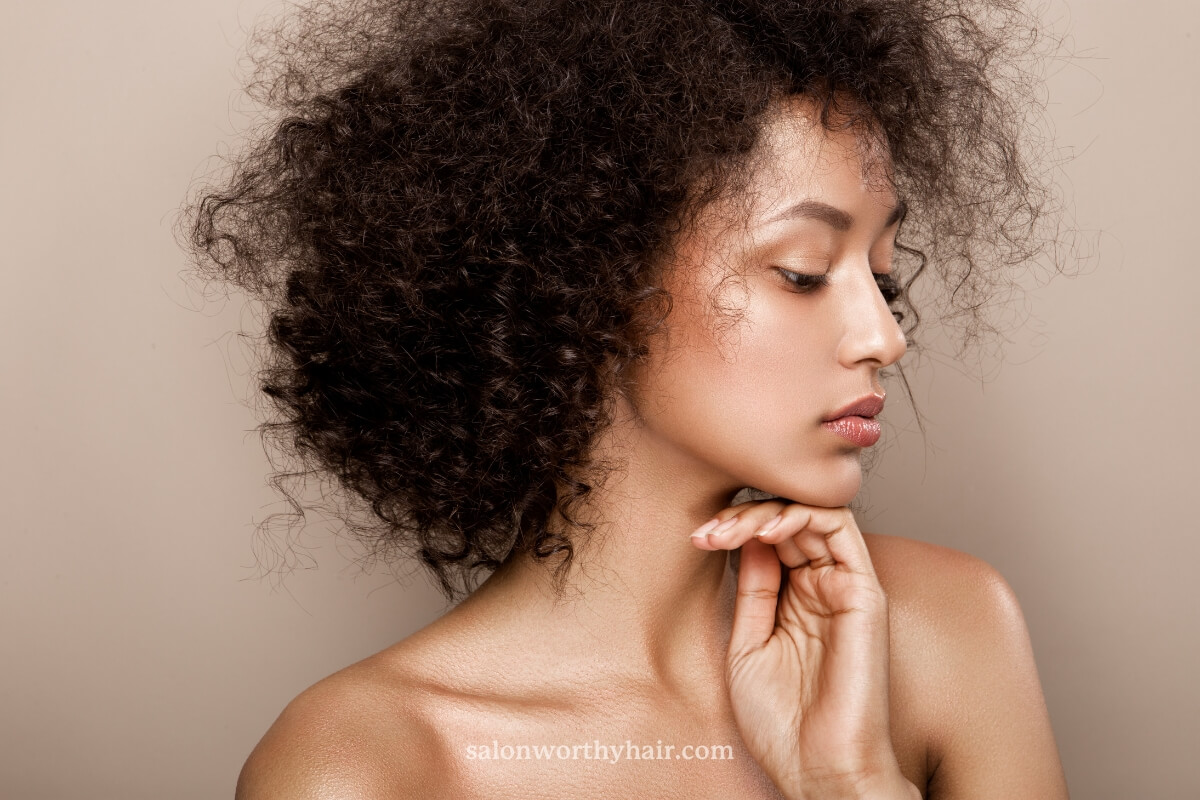
If you find yourself constantly struggling with frizz, it’s likely that your hair care routine may not be as effective as it could be.
So where do you start?
It’s easy. Start by identifying the activities that may be causing your hair to frizz, and then address them one by one.
If you’re having trouble identifying the culprits, let me help you:
- Washing
- Drying
- Combing or brushing
- Styling
- Sleeping
- Doing chemical treatments
- Being outdoors
- On holiday (at the beach or pool)
- When working out
- When wearing hair accessories
Now let me show you how to prevent frizzy hair by adjusting your techniques and products accordingly for each of these activities.
Table of Contents
- Preventing Frizz During and After Shower
- When Drying Your Hair
- When Combing or Brushing
- When Styling
- When Sleeping
- When Doing Chemical Treatments
- From Weather Conditions
- When Working Out
- On Holiday
- When Wearing Hair Accessories
- For Hair Types That Are Naturally Prone to Frizz
- Best Products to Prevent Frizzy Hair
- How to Prevent Frizzy Hair Without Products
- Preventing Frizz is Easier That Fixing It after
Preventing Frizz During and After Shower
The best opportunity to stop frizzy hair begins right in the shower.
If your hair is always frizzy after washing and you find yourself spending hours with a blow dryer trying to tame it, you may need to reconsider your hair-washing technique and your shampoo and conditioner.
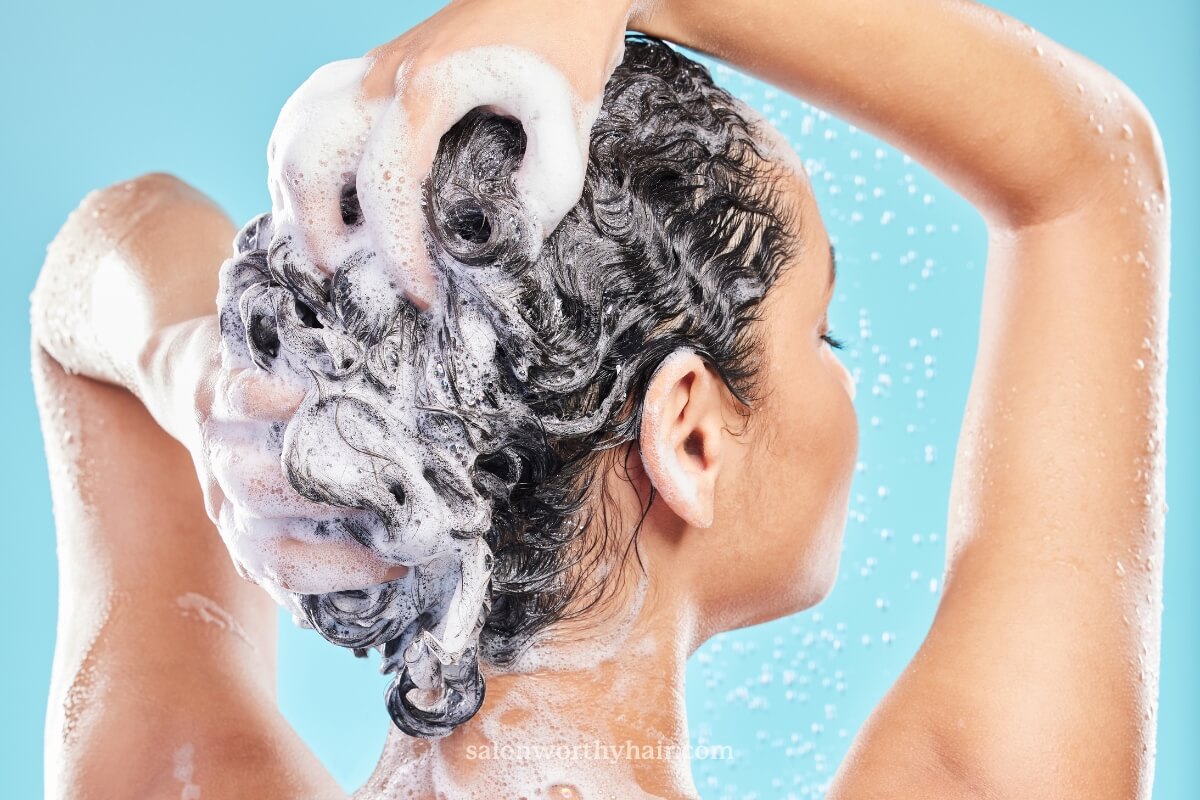
Another easy mistake most people do is washing their hair with hot water. Hot water can strip your hair of its natural oils and swell the cuticle. Instead, you should use lukewarm water to wash your hair and finish off with a cold water rinse. Cold water contracts the cuticle layer, making the hair smooth and frizz-free.
We know a lot of people struggle with frizz after washing their hair, so we’ve written a guide to address this problem. Here’s the link:
When Drying Your Hair
To prevent frizz when blow-drying:
- Make sure your hair is not soaking wet.
- Gently towel-dry with a microfiber towel or air-dry your tresses.
- Apply a heat protectant to your hair to shield it from the direct heat of the blow dryer.
A blow dryer diffuser can also help to disperse the airflow, reducing the impact of direct heat. If you have long hair, using the blow dryer with your head upside down can help to add volume and bounce. This technique works by lifting the hair roots away from the scalp, creating a fuller look.
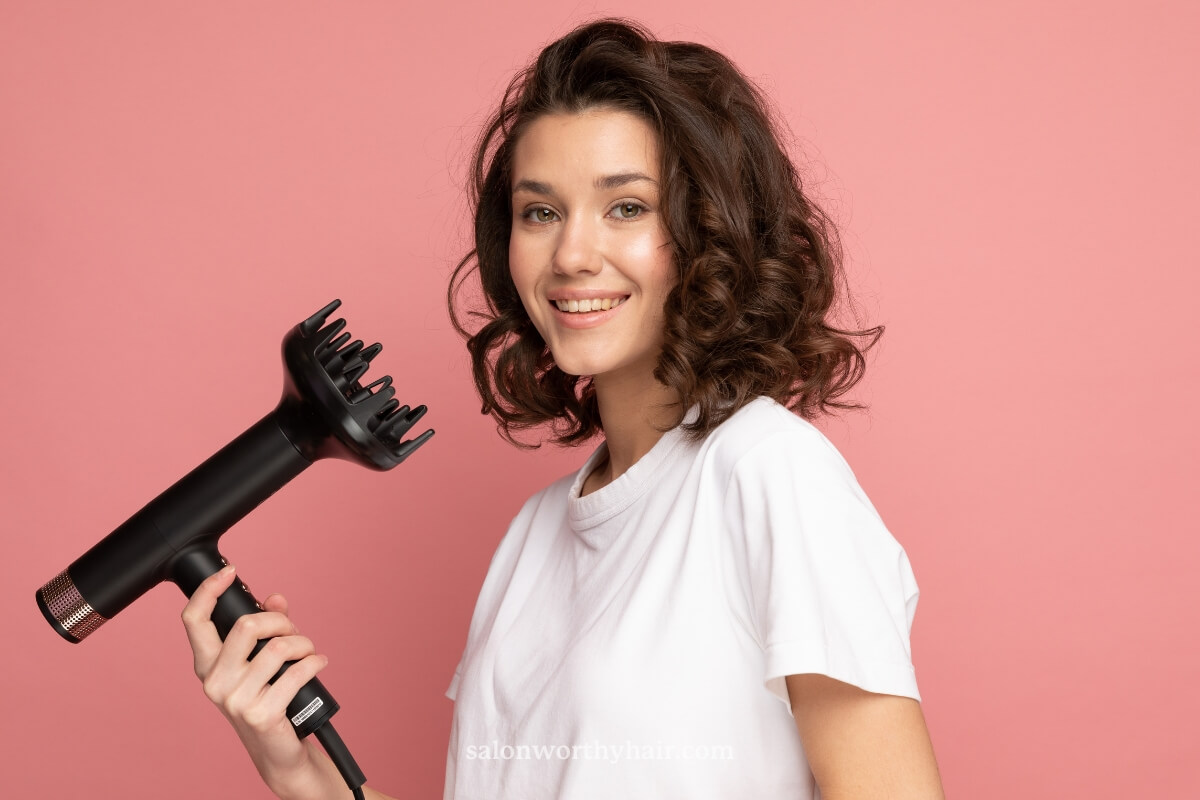
If your hair is prone to tangling when washing, use a detangling comb or a round brush to gently undo knots and tangles, and apply a heat-activated serum or anti-frizz cream before you start. Heat-activated hair products are excellent at locking moisture in the hair when heat styling.
If you prefer to air dry your hair, do it away from a steamy bathroom to prevent the humid air from poof-balling your hair.
Use the air drying time to start styling your hair while it’s damp. Styling your hair when it’s completely dry is not recommended, as this is when it’s more likely to frizz up when you take a hairbrush or straightening iron to it.
When Combing or Brushing
To prevent frizz when combing or brushing, never brush your hair dry unless you’re using a boar bristle brush. Brushing dry hair will rip through your locks, making your hair disorderly and messy.
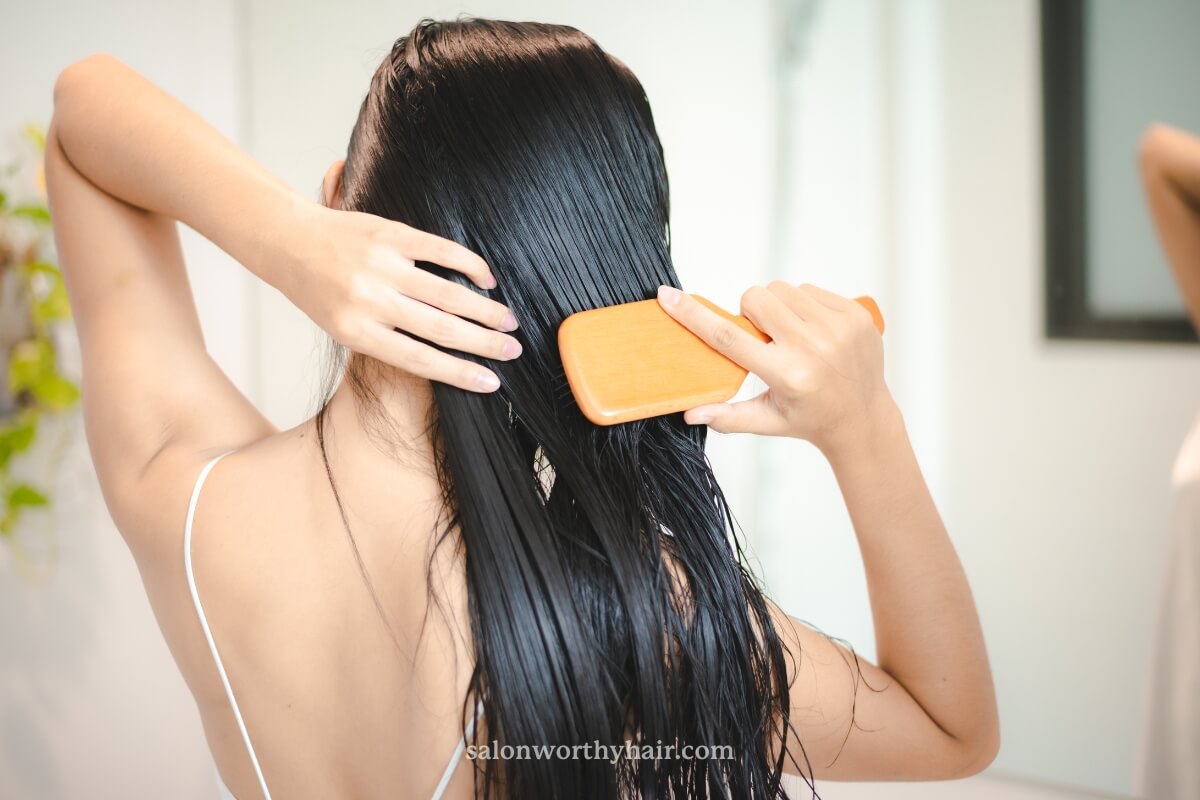
Brush or comb your hair when damp with a wide-toothed comb or detangling brush, ideally with conditioner in the hair to provide slip and lubrication. The lubrication from the conditioner and water allows the bristles of the brush or comb to glide effortlessly through the hair.
Start at the ends and work your way up to the roots to minimize breakage. Detangling from the ends helps to loosen through knots and tangles without excessive pulling or tension on the hair, reducing the risk of breakage.
- Best comb to use: Wide-toothed comb.
- Best brush for detangling wet hair: Wetbrush.
- Best boar bristle brush: Denman.
You’ll notice I added an exception for the boar bristle brush above. Let me explain why this modest hairbrush is excellent for taming frizzy hair.
A boar bristle brush is excellent at distributing the hair’s natural oils (sebum), detangle, and smoothen the hair cuticles because the bristles are gentle and soft, and they do not create static electricity. The bristles of a boar bristle brush are similar in texture to human hair, which allows the brush to pick up and distribute sebum evenly from the scalp to the ends of the hair, providing the hair with moisture and shine.
Recommended:When Styling
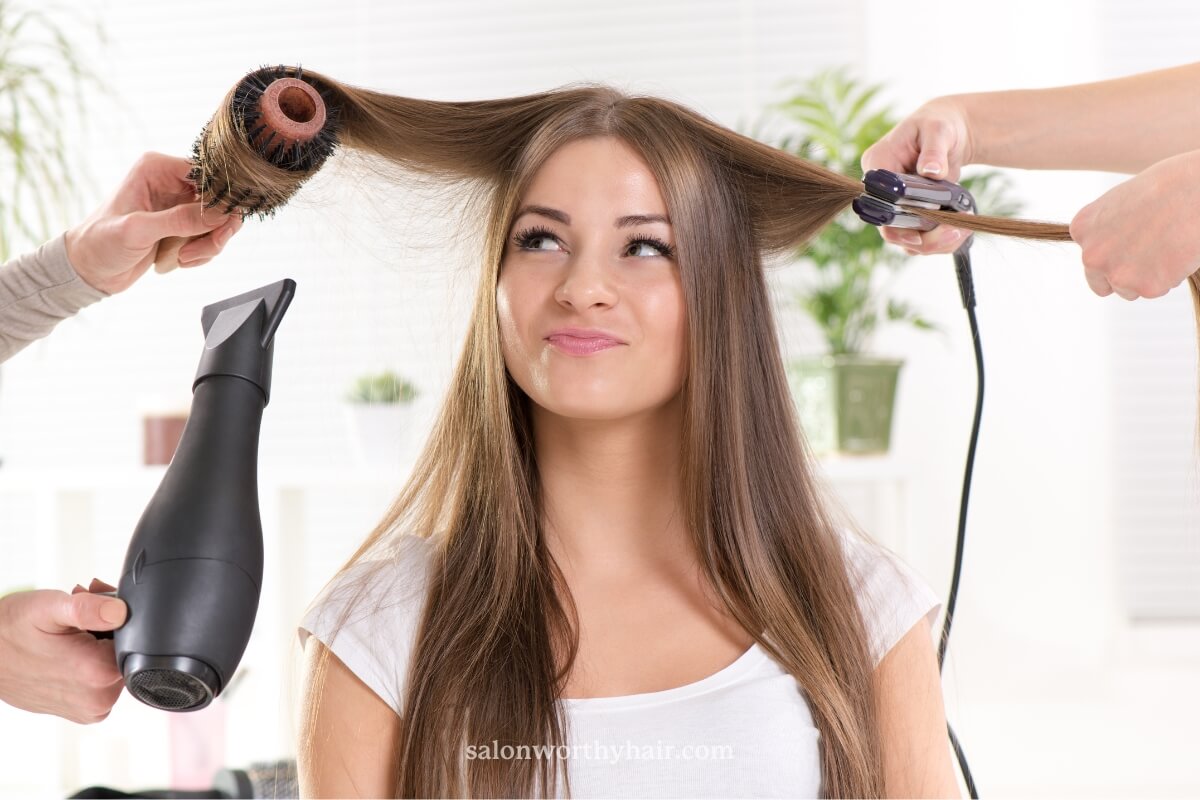
To prevent frizzy hair when straightening or curling with hot tools, follow the steps below:
- Ensure the hair is completely dry.
- Apply heat protectant.
- Use the correct temperature for your hair type.
- Style your hair in small, manageable sections.
- Do not hold the styling tool for too long in one place.
- Finish with a lightweight hair serum.
Heat styling tools can produce static electricity and zap the hair’s natural moisture, leading to frizziness and potentially hair breakage.
When Sleeping
To prevent frizzy hair when sleeping, use a silk or satin bonnet to wrap your hair or sleep on a silk pillowcase. Avoid standard cotton pillowcases because the coarse texture of cotton materials creates friction between the hair and the pillow, leading to bedhead and morning frizz.

Silk and satin materials are much smoother than cotton and will not rub against your hair while you sleep. Instead, your hair will glide on the material no matter how much you twist and turn through the night.
For more tips, read our sleeping guide:
When Doing Chemical Treatments
Coloring and bleaching treatments can cause frizz by disrupting the cuticle layer and making the hair fibers porous.
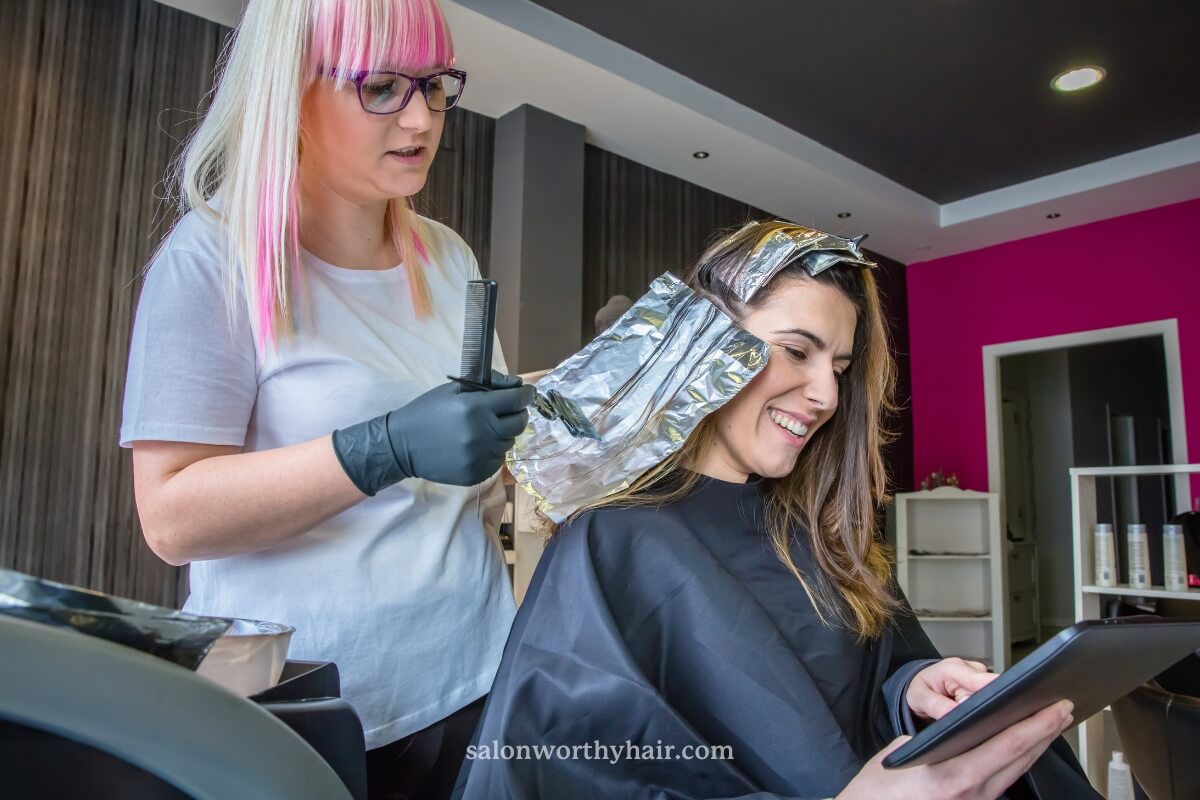
That’s where products like Olaplex can be very useful.
Olaplex bond repair can be added to your chemical services to help strengthen the hair and make it less prone to breakage and frizz. The treatment strengthens and re-links broken bonds in the hair to make it more resilient during chemical services.
Always ask your hairstylist to use Olaplex during your treatments if available.
From Weather Conditions

Different weather conditions can affect your hair and cause frizz. For example, changes in humidity, temperature, and wind.
Here’s how you can prepare your hair depending on the weather to prevent it from frizzing:
Humidity
High humidity causes frizz because excess moisture in the air penetrates the hair shaft, causing it to swell and distort.
To prevent your hair from frizzing in high humidity:
- Use an anti-frizz serum or anti-frizz hairspray. These products add a silicone protective coating to seal the hair cuticle and lock out moisture.
- Opt for hairstyles that prevent frizzing, such as braids or buns.
- Avoid touching your hair too much.
Dry, cold weather
Dry, cold weather can cause hair to become static and frizzy due to the lack of moisture in the air. To prevent frizz in dry, cold weather:
- Apply a leave-in conditioner or hair oil to help to prevent your hair from drying out.
- Use a humidifier indoors to boost moisture into the air. It will prevent static and frizz.
Rainy weather
Rainy weather can contribute to frizzy hair due to various factors beyond the typical increase in humidity. Wind, the change in atmospheric pressure, and the rainwater can all confuse your hair and mess up any hairstyle.
To prevent frizz in rainy weather:
- Use water-resistant hair products, such as a water-resistant hairspray or a silicone-based serum, to help protect your hair from moisture.
- Carry an umbrella or wear a hat to shield your hair from the rain.
- Opt for a protective hairstyle that will hold up in the rain.
Windy Weather
Windy weather can cause hair to tangle and become frizzy due to constant movement and friction. To prevent frizz in windy weather:
- Use a smoothing hair product, such as a hair oil or anti-frizz serum, to help reduce friction and keep your hair smooth.
- Wear your hair in a bun or ponytail to keep it from blowing around and tangling.
- Use hair accessories like headbands, clips, or scarves to keep your hair in place and minimize tangles.
Take preventative measures and adjust your hair care routine according to the weather conditions to minimize frizz and keep your hair under control.
Also check:When Working Out
When you exercise, moisture from sweat and heat from the scalp create a humid environment for the hair. Sweat also contains various minerals, including sodium (salt), which draws moisture away from its surroundings.

Another factor is the type of exercise you’re doing. For example, high-intensity workouts that involve a lot of jumping, bouncing, or running can cause hair to bounce around and tangle, leading to frizz.
To prevent frizz when working out, you can do a few things:
- Use a moisture-wicking headband to soak up excess sweat.
- Tie your hair up to keep it off your neck. Avoid tight hairstyles that can cause tension and breakage. Opt for hair ties made from soft, stretchy materials like silk or satin-covered elastics that don’t snag or pull your hair.
- Use dry shampoo: If your hair is prone to oiliness or greasiness, consider using a dry shampoo before and after your workout. It will soak up excess oil and sweat from your scalp.
- If you swim as part of your workout routine, wear a swim cap to protect your hair from the drying effects of chlorinated water. Wet your hair with fresh water and apply a leave-in conditioner before wearing the swim cap to help lock in moisture.
- Rinse your hair after your workout. After exercising, rinse your hair with fresh water to remove sweat.
- Use an anti-frizz serum or hair oil: After drying your hair, apply a lightweight anti-frizz serum or hair oil to smooth any remaining frizz and add shine.
On Holiday

On holiday, your hair can be exposed to various elements such as sun, saltwater, chlorine, and humidity, leading to frizziness.
Here are some tips to prevent frizzy at the beach or pool:
- Use UV protection for hair:Apply a leave-in conditioner or hair spray that contains UV filters to protect your hair from the sun’s harmful rays.
- Wear a hat or cover-up:Wear a wide-brimmed hat or a headscarf to shield your hair from the sun, wind, and sand.
- Rinse your hair before and after swimming:Wash your hair with fresh water before entering the pool or sea. It saturates the hair to minimize the absorption of saltwater and chlorine. After swimming, rinse your hair thoroughly to remove any salt or chlorine that can cause dryness.
- Avoid heat styling:Embrace your hair’s natural texture on holiday, and avoid using heat styling tools. If you must use heat, use a heat protectant spray beforehand.
- Hydrate your hair:Use a deep conditioning treatment or hair mask once or twice weekly to replenish your hair.
- Choose the right hair products:Use shampoos, conditioners, and styling products specifically designed for sun, sea, and pool exposure.
- Opt for low-maintenance hairstyles:Choose simple hairstyles that require minimal maintenance. This will help minimize frizz and keep your hair neat and stylish.
When Wearing Hair Accessories

Hair accessories like beanies, headbands, and elastics can cause frizz due to various factors, such as:
- Materials:Accessories made from wool or synthetic fibers can generate static electricity, causing hair strands to repel each other and create frizz.
- Subtle friction:Movement while wearing accessories can create subtle friction, roughening the hair cuticle and resulting in frizz.
- Moisture wicking:Some materials can wick away moisture, leading to hair dryness and frizz.
- Prolonged tension:Tight accessories can weaken the hair shaft, making it more prone to breakage and frizz.
- Accessory-induced tangles:Accessories can inadvertently cause tangles, leading to frizz when detangling hair.
- Hair microclimate:Beanies can trap heat and moisture, disrupting the hair’s moisture balance and causing frizz.
- Accessory-induced friction:Putting on, adjusting, or removing accessories can cause friction, roughening the hair cuticle and promoting frizz.
To prevent frizz after wearing a beanie or any other types of hair accessories:
- Choose materials that create less friction:Opt for hair accessories made from smooth, gentle materials like silk or satin. Avoid materials like wool and synthetic fabrics.
- Use anti-frizz products:Before putting on your hair accessory, apply a lightweight anti-frizz serum, hair oil, or leave-in conditioner. These products can lubricate the and add slip to the hair to prevent them from rubbing onto each other.
- Avoid tight accessories:Tight hair accessories create tension in the hair. Choose accessories that fit comfortably and won’t pull on your hair too much.
- Limit the time you wear accessories:Avoid wearing hair accessories for extended periods. Give your hair a break by alternating between wearing accessories and leaving your hair free.
- Use a hair refresher:After removing your hair accessory, use a hair refresher spray or a small amount of hair oil to smooth out any frizz and refresh your hair.
For Hair Types That Are Naturally Prone to Frizz
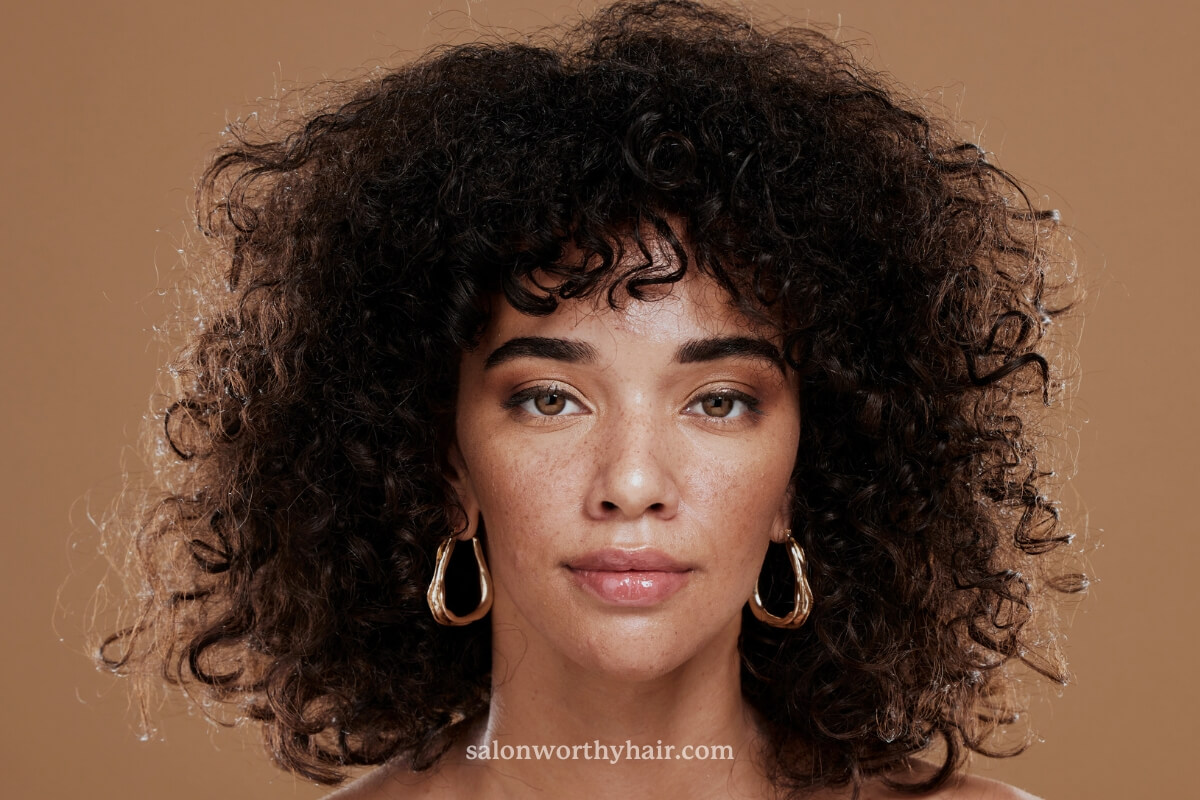
Some hair types are more naturally prone to frizz than others. For example, curly hair, thick hair, dry hair, and fine hair.
Regardless of weather conditions, styling techniques, or customized hair care routines, the following hair types will always have a higher chance of frizzing.
If you have any of the following hair types, follow these best practices below to combat frizz:
Curly Hair
Curly hair is naturally prone to frizz due to its shape. The curves and bends in curly hair make it more difficult for the natural oils produced by the scalp to travel down the hair shaft, which can result in dryness and frizz. To fix curly hair frizz, moisturize it with regular deep conditioning treatments and use products designed specifically for curl textures, such as leave-in conditioners and curl creams.
Read: Why does curly hair get frizzy and the best way to fix it.Thick Hair
Thick hair tends to be more prone to frizz because it has a larger diameter. It requires more products and natural oils to moisturize the hair shaft. Plus, thick hair is very resistant to styling.
Dry Hair
Dry hair is naturally more prone to frizz because it lacks moisture. To fix frizz in dry hair, it’s important to use a moisturizing shampoo and conditioner and avoid over-shampooing, which can strip the hair of natural oils. Apply a leave-in conditioner or hair oil to damp hair before styling, and avoid using heat tools too often.
Fine Hair
Fine hair is more prone to frizz due to its delicate structure and lower density than thick hair. To fix frizz in fine hair, use a lightweight shampoo and conditioner and apply a volumizing mousse or spray to damp hair before styling. Avoid over-styling with hot tools and let the hair air-dry or use a diffuser attachment on a blow dryer.
Best Products to Prevent Frizzy Hair
The best products to prevent frizz are those that provide moisture, manageability, resistance, and protection from changing weather conditions like humidity and wind. These products often contain a combination of ingredients such as humectants, silicones, natural oils, smoothing polymers, and anti-static agents, which work together to keep hair smooth, shiny, and frizz-free.
Some frizz-preventing products may offer heat protection and pH-balancing properties to enhance their effectiveness.
Based on these qualities, we’ve handpicked the best products for hair types and styling routines. Click below to see the list:
Best products for frizzy hair.How to Prevent Frizzy Hair Without Products
If you’re not a product junkie, there are several natural ways to prevent frizz without relying on store-bought products.
Here are some effective techniques and habits you can incorporate into your haircare routine for smoother, healthier, and frizz-free hair.
- Choose the right comb or brush:
Avoid using plastic combs and brushes, as they can cause static, leading to frizz. Opt for a wide-tooth comb made of wood or a brush with natural bristles to gently detangle and style your hair. - Minimize heat styling:
Excessive heat styling can damage your hair, making it more prone to frizz. Embrace your natural texture by air-drying your hair whenever possible and limiting the use of heat styling tools. - Use a microfiber towel or cotton T-shirt to dry your hair:
Microfiber towels offer a gentler alternative to regular towels, which can be rough and cause friction-induced frizz. By using a microfiber towel or even a soft cotton T-shirt to carefully dry your hair, you can effectively prevent breakage and minimize frizz. - Protect your hair while sleeping:
Sleep on a satin or silk pillowcase to reduce friction and avoid frizz caused by tossing and turning at night. You can also wrap your hair in a silk or satin scarf to provide extra protection. - Maintain a balanced diet and stay hydrated:
A healthy diet and proper hydration are crucial in maintaining hair health. Include foods rich in omega-3 fatty acids, vitamins, and minerals to nourish your hair from within. Drinking enough water will also help to keep your hair hydrated and less prone to frizz. - Trim your hair regularly:
Regular trims can prevent split ends that may contribute to frizz. Aim to trim your hair every 6-8 weeks to prevent your ends from fraying. - Avoid washing with hot water:
Use lukewarm water to wash your hair and finish with a cold water rinse. Cold water helps to seal the hair cuticle to lock in moisture and reduce frizz. - Try a DIY hair mask:
Natural hair masks made from ingredients like coconut oil, avocado, and honey can help to restore moisture and reduce frizz. Apply the mask to your hair, let it sit for 20-30 minutes, and then rinse it with lukewarm water. - Be gentle when detangling:
Always detangle your hair from the ends and work your way up to the roots to avoid pulling or tugging. - Practice proper hair care techniques:
Avoid over-washing your hair, as it can strip away its natural oils. Choose a gentle shampoo and conditioner, and consider using a diluted apple cider vinegar rinse to balance your hair’s pH levels.
You can also check: 👇
Best Natural DIY Remedies for Dry and Frizzy HairPreventing Frizz is Easier That Fixing It after
Prevention is indeed better than cure.
Taking proactive steps to prevent frizz is far easier and more effective than trying to fix it after it occurs.
Adopting a comprehensive hair care routine that addresses the root causes of frizz can make your hair more manageable with minimal effort. Prevention strategies include:
- Using the right hair tools.
- Limiting heat styling.
- Protecting hair while sleeping.
- Maintaining a balanced diet.
- Staying hydrated.
These habits stop frizz and contribute to overall hair health, making your locks more resistant to damage and environmental factors.
Remember, consistency is key. And since everyone’s hair is unique, finding the right combination of techniques and methods that work for your specific hair type may require some experimentation.
Next:
About the Author
 Shehnaz Shirazi
Shehnaz ShiraziShehnaz Shirazi has been writing in the beauty and cosmetics industry for over 8 years, sharing her expansive hair care and beauty knowledge. Shehnaz researches and tests new hair care trends and publishes her insights here.